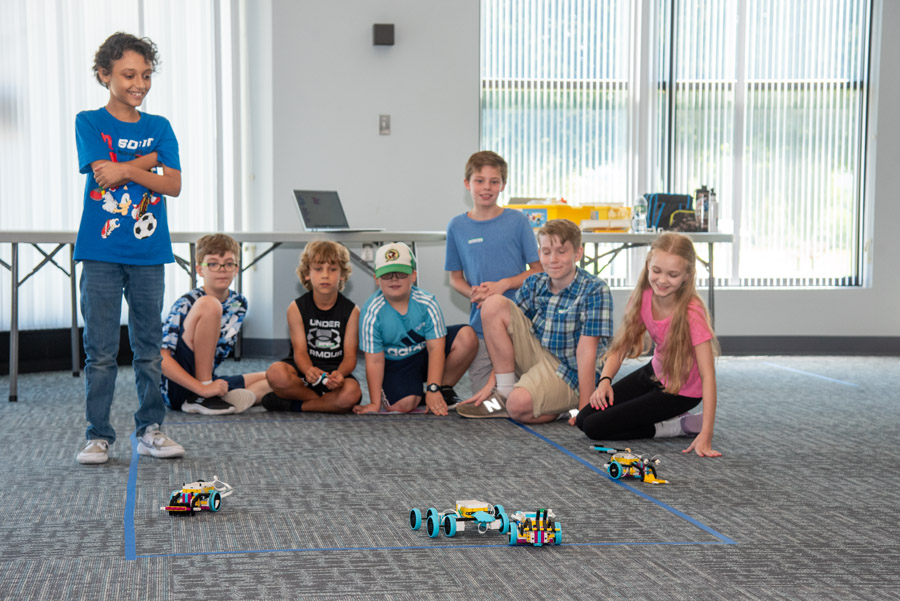
Students learn STEM skills at Lego Camp
Every summer, Luzerne County Community College hosts students from local elementary and middle schools for its annual Lego robotics camp where, in the words of Howard Wolowitz from The Big Bang Theory, "Engineering is about turning ideas into reality" and these students did just that.*
The camp teaches students about the STEM (Science, Technology, Engineering, Math) industry by learning to engineer and design robots, coding with the online software Scratch, developing essential STEM and Team Building skills, learning Core Values, competing in multiple challenges such as Battle of the Bots, Lego programming lessons, problem-solving, and innovation. They also learn the engineering design process - ask, brainstorm, design, build, test and improve.
Students then showcased what they learned all week to their family and friends in events such as the 100m Sprint, where students must drive their robots as fast as they can. Shot-Put, where the students must control their robots by moving a ball to get it to the most distance. Breakdancing Bots, where the students must control their robots against each other to see which bot has the coolest dance moves. And Soccer, where the students must control their robots to get the ball in the net. Students were put into teams of three - Team Friend, Team American Flag and Team Bob the Bot.
Third-year student of the camp, Samuel Pokrifka, 11-year-old, Forty Fort, has had Bob the Bot two of his three years at the camp and tries to beat everyone. But most importantly, Pokrifka and his partner, Adriana Mitchell, 10-year-old, Jenkins Township, like coming to camps like this.
"I've had Bob the Bot for the past two camps," said Pokrifka. "We are programming Bob to move to the ball for the shot-put competition. Everyone must try to beat Bob. Coming to this camp is fun because I get to learn new things and make new friends every time I come here."
Instructor Jacob Kozlek, Sugarloaf, said there are many ways kids can continue their interest in STEM.
"Students can continue in their STEM journeys by joining a robotics league and working with various coding software such as Scratch," said Kozlek. "Scratch is the world's largest coding software created by MIT (Massachusetts Institute of Technology) to teach coding to students interested in STEM and robotics in a fun and interactive way. It teaches them how to recreate games, how to build things and how to program them. And students can take what they learned from Scratch and use it throughout their schooling careers."
Kozlek said that being a part of STEM, robotics, and Lego camps exposes kids at a young age to the sciences and they can then take that knowledge into higher education.
"Taking science, math and computer classes; joining science clubs, robotics teams and math competitions; exploring websites such as Scratch and other interactive STEM platforms; and experimenting with science kits, build models and practice coding on their own creations can help give kids the opportunity to see what the sciences are all about at a young age," Kozlek said.
Attendees of this year's camp were Youssef Abdelazim, 9, Wilkes-Barre; Christian Bonk; Aaron Henry,9, Wapwallopen; Jacob Hoffman, 11, Mountain Top; Adriana Mitchell, 10, Jenkins Township; Drew Nowakowski, 11, Mountain Top; Carson Petrick, 10, Mountain Top; and Samuel Pokrifka, 11, Forty Fort.
According to the U.S Bureau of Labor Statistics, STEM careers will increase by as much as 10.8% by 2032 compared to non-STEM careers which will increase by 2.3%. The median annual wage for a STEM career is $101,650 compared to the media annual wage of a non-STEM career of $46,680. STEM is very high demand, has competitive salaries, and utilizes problem solving and innovation.
Major careers in STEM include: Biologist, Biochemist, Microbiologist, Chemist, Materials Scientist, Forensic Scientist, Physicist, Astronomer, Meteorologist, Geologist, Environmental Scientist, Oceanographer, Software Engineer, Data Scientist, Cybersecurity Analyst, Network Engineer, IT Support Specialist, Web Developer, Telecommunications Engineer, Systems Analyst, Aerospace Engineer, Aeronautical Engineer, Biomedical Engineer, Chemical Engineer, Civil Engineer, Structural Engineer, Electrical Engineer, Electronics Engineer, Mechanical Engineer, Statistician, Mathematician, Actuary, and Operations Research Analyst.
Luzerne County Community College offers a few starter classes and degrees to kick start a career in STEM including Biology, Chemistry, Computer Science, Forensic Science, Mathematics and Pre-Engineering.


